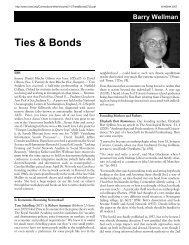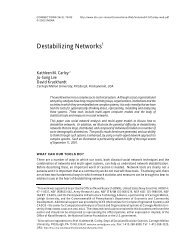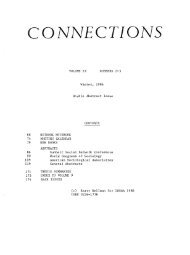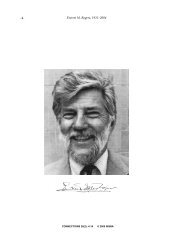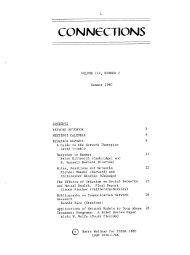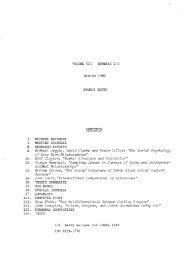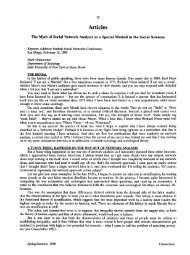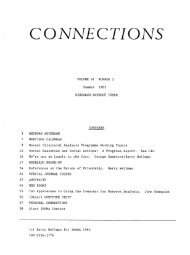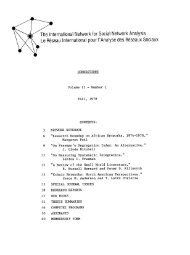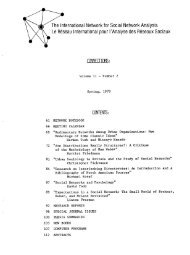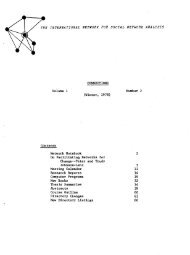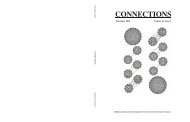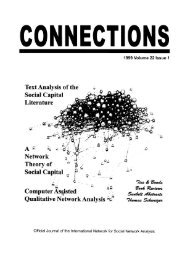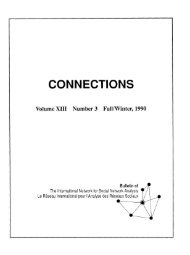Sunbelt XXXI International Network for Social Network ... - INSNA
Sunbelt XXXI International Network for Social Network ... - INSNA
Sunbelt XXXI International Network for Social Network ... - INSNA
You also want an ePaper? Increase the reach of your titles
YUMPU automatically turns print PDFs into web optimized ePapers that Google loves.
Experimental Evidence For Peer Effects On Adolescent Cigarette Smoking And <strong>Social</strong> <strong>Network</strong>‐based InterventionsAn, Weihua<strong>Social</strong> <strong>Network</strong>s and HealthAdolescents, Smoking, Experiments, Peer Effects, <strong>Social</strong> <strong>Network</strong>‐based InterventionFRI.AM1This study addresses a classic question in social networks and health: whether and to what extent peers affect a person’s attitudes and behaviors regardingcigarette smoking. Studying peer influence has a long root in sociology, which can be traced back to Durkheim, Simmel, Mead, Blumer etc. As far as cigarettesmoking is concerned, many studies have identified peer influence as one of the most important risk factors and found strong correlations of smokingbehaviors among peers. But it is very difficult to identify and estimate peer effects using only observational data due to problems like selection, reflection,simultaneity, confounding, etc. In this study, using a large sample of middle school students (around 100 classrooms and 6,000 students are involved) in China,coupled with ascertainment of network structure within these schools (e.g., selecting students who are central in the social networks and choosing studentgroups rather than individuals students as intervention targets), I conducted a novel social experiment with a partial population design involving providingsocial network‐based interventions that aim to accelerate the diffusion of desirable attitudes and behaviors regarding cigarette smoking. I expect that thiswork will not only provide experimental evidence <strong>for</strong> peer effects on adolescent cigarette smoking, and shed light on fundamental sociological questions, suchas group identity, social cohesion, and norm <strong>for</strong>mation, but also help develop more effective smoking prevention programs. The contributions of this study arethreefold. It is the first study, according to the author's best knowledge, that provides experimental evidence <strong>for</strong> peer effects on cigarette smoking. It is alsothe first study that makes the distinction of peer effects under control from peer effects under treatment and provides experimental estimates <strong>for</strong> both ofthem. Another and more important contribution is that it is among the first group of studies, if not the first one, empirically evaluating whether opinion leadersare more influential in terms of spreading positive attitudes and behaviors toward cigarette smoking among adolescents. The results of such an evaluationhave important implications <strong>for</strong> designing more effective tobacco control policies.Exploring Trends In Friendship Segregation In Middle And High SchoolGrewal, Elena T.Adolescent Friendship <strong>Network</strong>sAdolescents, HomophilyWED.PM2This paper uses data from the National Longitudinal Study of Adolescent Health (Add Health) to explore how friendship segregation changes over time from7th to 12th grade. The paper measures homophily by the percent of same‐race friendship nominations. Then, regression models predict homophily using thepercent of same‐race students in the grade as well as grade, to determine the whether homophily increases as grade increases, controlling <strong>for</strong> the proportionof same‐race students in the grade. The paper finds that students in higher grades experience greater racial homophily. The paper then looks at whetherschool characteristics predict homophily, and finds that southern schools are more homophilous, but does not find an interaction between southern schoolsand the trend across grades.



